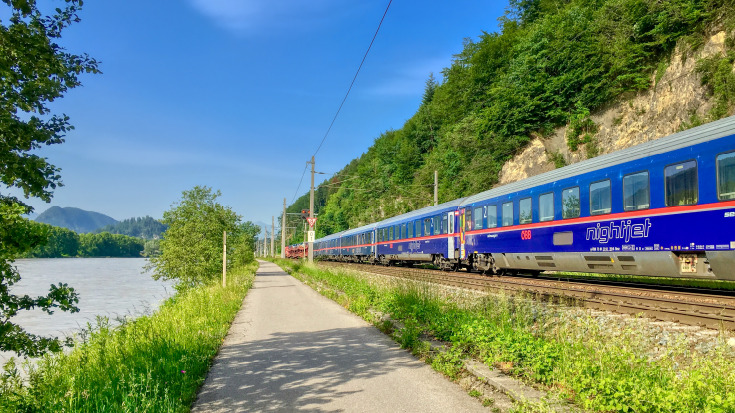Climate protection needs more Europe in rail transport
The European Year of Rail offers an opportunity for additional high-speed trains and night services / For an EU with attractive alternatives to environmentally harmful short flights
Berlin, March 4th 2021: The Pro-Rail Alliance and the Magistrale for Europe initiative are calling for a rapid expansion of European rail links for international high-speed trains and night services. “The European Year of Rail must give a boost to international rail transport with high-speed trains and night services across the continent,” said Dirk Flege, managing director of the Pro-Rail Alliance, in Berlin on Thursday. “The goal must be to gradually make climate-friendly rail transport the first choice for all consumers in the EU. Politicians should set themselves this realistic goal in the European Year of Rail,” said Flege.
Europe has not yet grown together on the railways
“It is possible to create significantly more attractive alternatives by rail to the short- and medium-haul flights, which are particularly harmful to the climate,” Flege explained. “To date, however, Europe has not really grown together in the rail sector – too much still needs to be done on a national level. This makes the opportunity for improving international rail transport all the greater, with better cooperation between the member states and a strengthening of the railways throughout Europe. Climate protection needs more Europe on the railways,” said Flege.
Magistrale for Europe has been fighting for international rail links for 30 years
“New direct cross-border services, high-speed trains and night train services can replace short-haul flights within Europe in the long term,” said Annika Hummel, Managing Director of Magistrale for Europe. This initiative has been campaigning for 30 years for a continuous high-speed line on the route from Paris to Budapest/Bratislava via the Karlsruhe region. “However, unequal competitive conditions between rail and air transport continue to ensure that intra-European flights are often much cheaper than corresponding train tickets,” Hummel criticised.
Position paper identifies the most important issues in European rail transport
In a position paper on the European Year of Rail, the Pro-Rail Alliance formulates three requirements. In order to strengthen international rail transport, the European Union and the member states must, according to the concept, firstly expand the rail network across borders, secondly make competition between modes of transport fairer and thirdly use the EU Commission’s Green Deal to boost the railways in the Year of Rail.
The equality gaps in the transport sector must be closed
The expansion of the cross-border rail network includes an EU funding programme for the electrification of border crossings and a political initiative by the German government to upgrade all rail border crossings with an overhead electric line by 2030 in cooperation with neighbouring countries. For more fairness in the transport sector, the EU and the German government should jointly put an end to the unfair treatment of train customers compared to air travellers with regard to the VAT on international tickets. The third point is about more fairness in infrastructure financing. For road transport, unlike for rail transport, there is no obligation in the EU to charge users a toll for infrastructure use. The Pro-Rail Alliance is in favour of introducing compulsory tolls for lorries and long-distance coach services as well. Until this is implemented, the German government should exhaust the EU legal framework and temporarily suspend the rail charges completely during the Corona pandemic. In the EU Council of Ministers, Germany has also voted in favour of this relief option.
Magistrale for Europe sees a great need for action in Germany in particular
The “Magistrale for Europe” initiative, founded in 1990, is one of the pioneers in the fight for European rail links. The Karlsruhe-based initiative now has 24 members, including cities, regions and chambers of industry and commerce. “In three decades, the initiative has enjoyed great successes, such as the continuous expansion of the high-speed line system in France,” said Hummel. “But on the German side in particular, there are still problems in many places.” As examples, Hummel cited the electrification gap on the Munich-Mühldorf-Freilassing line, the inactivity in the planning and construction of the connecting section between the Paris – Strasbourg high-speed line (LGV Est européenne) and the Karlsruhe – Basel expansion project, as well as unresolved problems for transport planning overall due to the Stuttgart 21 project.



